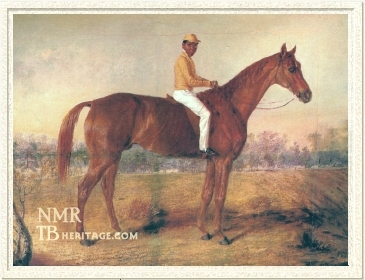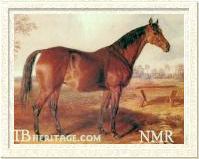|
|
Planet

|
|
 |
|
|
Planet, a 15. 2 1/2 hand tall chestnut colt of 1855, was considered the best son of the good racehorse and sire Revenue, and the best race horse after Lexington up to the Civil War.
His sire, Revenue, was the third great son sired by imported Trustee (by Catton), bred and owned throughout his life by John Minor Botts, a prominent Virginia breeder and an influential economist and statesman, who was briefly jailed during the Civil War for his outspoken support of the Union. Revenue was born in 1843, out of a good race mare and producer, Rosalie Somers, by Sir Charles. He won all three of his races at age three, one at a mile, and two in two mile heats, his last race of the year in Baltimore making the two miles in 3:49, a very good time. At age four, under supervision of his trainer, Colonel William R. Johnson, he was sent south to run at Charleston's Washington Course, winning two races there in 2 mile and 3 mile heats. Moved to New Orleans in December, he was beaten in a 4 mile heats race by Fanny King, a Glencoe daughter, and then was engaged for a match race against her, at $10,000 a side, in New Orleans, which he won. Three days later he ran a 4 mile heats race against Verifier, which he lost, but came back a week later to beat the Glencoe horse Topaz and Jerry Lancaster in three heats over 4 miles
At age five Revenue ran seven times in New Orleans, all four mile heats, and won five of them. Johnson died soon after, and Revenue's training was taken over by William McClean; Revenue ran until he was eight years old, winning twice in at the John Bascombe Course at Mobile, Alabama, where he was lodged at the stables of R.H. Long, after which at age eight, he was taken back to Virginia whre he won his final two races, two 3 mile heats at Broad Rock and Fairfield. He was finally retired to stud at Bott's Richmond, Virginia, farm. He was a great success as a stallion, heading the leading sire's list in 1860, and second on the list in 1861. His best son, on the turf and in the stud, was Planet. Botts placed Revenue at Bell Air Stud near Warrenton, Virginia, in 1866, which is where the great stallion died and was buried in the fall of 1868.
|

Nina, a great runner and great broodmare. Image ©National Museum of Racing. Used with permission.
| |
Planet's dam was Nina (1848), the best racing daughter of Boston, out of Frolicsome Fanny, by Lottery. Nina was purchased in the fall of her four year old year by Major Thomas Doswell, a long-time owner and breeder of race horses who had made his money in business in Richmond, and established his Bullfield stud farm along the Pamunky River in Virginia, which included three different race tracks. For Doswell she walked-over for the Virginia Jockey Club purse of $1,000, and won a handicap in 3 mile heats, and then was sent to Augusta, Georgia, where she won another 3 mile heats race, after which she broke down. |
Retired to Doswell's stud, she was bred to Revenue, producing her first foal, Planet in 1855, followed the next year by his brother, Exchequer, another good race horse. In all she produced fifteen foals, almost all of which were celebrated runners; her last, dropped when she was 25 years old, was Belmont Stakes winner Algerine, later grandsire of Rhoda B., the dam of Epsom Derby winner Orby and his sister, Rhodora, winner of the 1908 One Thousand Guineas.
Planet won at all distances, beginning at age 3, and was most famous as a four-miler, winning major four mile heat sweepstakes and Jockey Club purses at New Orleans; Ashland, Virginia; Savannah, Georgia, and Charleston, South Carolina, as well as numerous three and two-mile heats in various locations. He beat the top horses of his time, including Hennie Farrow, Socks, Arhtur Macon, Daniel Boone and Congaree. He won 27 of his 31 races, and was second in the other four, earning a total of $69, 700, catapulting him to the top of the list of leading money winners, a record he held for over twenty years.
At age six, after several defeats and with the outbreak of the Civil War, he was retired to Doswell's Bullfield stud, completely sound. Among his top running sons and daughters were the great race mare Katy Pease, Falmouth, Planetarium, Moonbeam, Planter, Whisper, and many others. He got few foals between what would have been his best years, 1861 through 1868, due to the exigencies of the war. In 1868 he was purchased by R.A. Alexander of Woodburn Farm in Kentucky, and lived there until his death in 1875, age 20. At Woodburn he only got mares not reserved for two other great sires standing there, Lexington, who also died in 1875, and Australian, who outlived him.
In addition to his speed and stamina in running, Planet was a natural trotter, and most of his exercise was conducted at that gait; he was able to trot a mile in three minutes. His daughter, Dame Winnie, produced the champion trotting stallion of Leland Stanford's, Palo Alto, when bred to Electioneer.
Planet's blood today is seen primarily through two of his daughters, Slipper, and Minnie Mc. The great stakes-winning stayer of the 1920s, Sarazen, and the 1970 2000 Guineas winner Mon Fils descend from Slipper.
Minnie MC was the dam of Kingman (1888), winner of the 1891 Kentucky Derby, and Bowling Brook (1895), winner of the Belmont Stakes, who twice defeated the great racehorse Hamburg. Planet's daughter, Ballet, was responsible for sending the important American Family of the Janus Mare Number 1 forward to today, producing such daughters as Blue Grass Belle (ancestress of Exterminator), Modesty, Lady Longfellow, Peg Woffington, Buff and Blue, and Vega (tail-female ancestress of Bunting, Dice, and Frilette). You can also find Planet in the pedigrees of the great race filly Regret (1912) and the sturdy handicapper and successful sire Fleet Nasrullah (1955).
--Patricia Erigero
|
|
|
|

